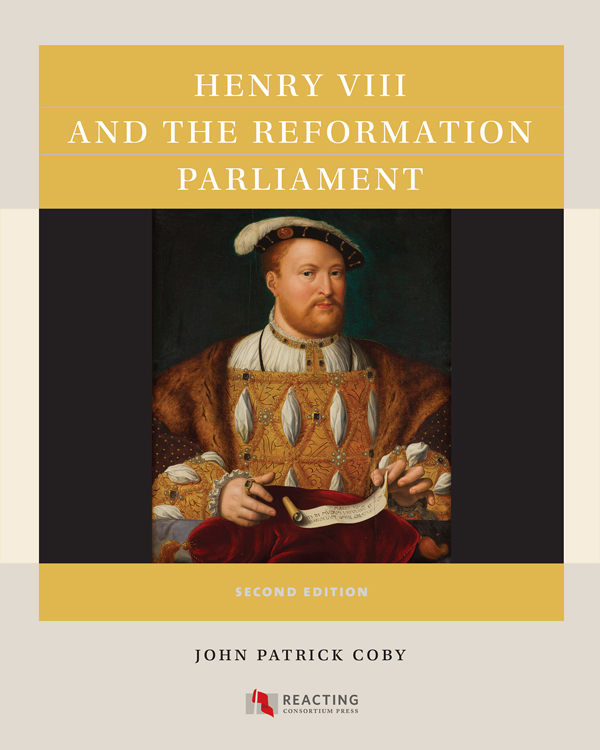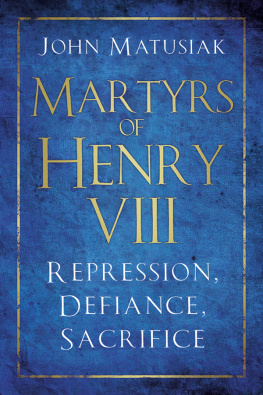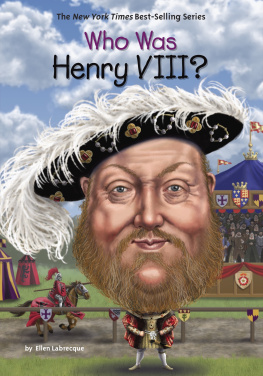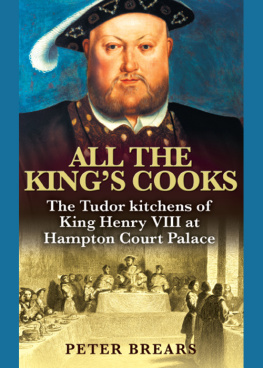John Patrick Coby - Henry VIII and the Reformation Parliament
Here you can read online John Patrick Coby - Henry VIII and the Reformation Parliament full text of the book (entire story) in english for free. Download pdf and epub, get meaning, cover and reviews about this ebook. publisher: Reacting Consortium Press, genre: Religion. Description of the work, (preface) as well as reviews are available. Best literature library LitArk.com created for fans of good reading and offers a wide selection of genres:
Romance novel
Science fiction
Adventure
Detective
Science
History
Home and family
Prose
Art
Politics
Computer
Non-fiction
Religion
Business
Children
Humor
Choose a favorite category and find really read worthwhile books. Enjoy immersion in the world of imagination, feel the emotions of the characters or learn something new for yourself, make an fascinating discovery.

- Book:Henry VIII and the Reformation Parliament
- Author:
- Publisher:Reacting Consortium Press
- Genre:
- Rating:4 / 5
- Favourites:Add to favourites
- Your mark:
- 80
- 1
- 2
- 3
- 4
- 5
Henry VIII and the Reformation Parliament: summary, description and annotation
We offer to read an annotation, description, summary or preface (depends on what the author of the book "Henry VIII and the Reformation Parliament" wrote himself). If you haven't found the necessary information about the book — write in the comments, we will try to find it.
Henry VIII and the Reformation Parliament — read online for free the complete book (whole text) full work
Below is the text of the book, divided by pages. System saving the place of the last page read, allows you to conveniently read the book "Henry VIII and the Reformation Parliament" online for free, without having to search again every time where you left off. Put a bookmark, and you can go to the page where you finished reading at any time.
Font size:
Interval:
Bookmark:

Henry VIII and the Reformation Parliament
REACTING CONSORTIUM PRESS
This book is a reacting game. Reacting games are interactive role-playing games in which students are responsible for their own learning. Reacting games are currently used at more than 400 colleges and universities in the United States and abroad. Reacting Consortium Press is a publishing program of the Reacting Consortium, the association of schools that use reacting games. For more information visit http://reactingconsortiumpress.org.
Henry VIII and the Reformation Parliament
SECOND EDITION
JOHN PATRICK COBY

2019 John Patrick Coby
All rights reserved
Set in Utopia and The Sans
by Westchester Publishing Services
Manufactured in the United States of America
The University of North Carolina Press has been a member of the Green Press Initiative since 2003.
ISBN 978-1-4696-4755-5 (pbk.: alk. paper)
ISBN 978-1-4696-4756-2 (ebook)
Cover Illustration: Portrait of Henry VIII. Painting by Joos van Cleve, circa 1535. The Burghley House Collection.
Distributed by the University of North Carolina Press
116 South Boundary Street
Chapel Hill, NC 27514-3808
www.uncpress.org
Contents
Illustrations Maps Tables
ILLUSTRATIONS
/
/
/
MAPS
/
/
/
/
TABLES
/
/
/
/
Henry VIII and the Reformation Parliament
Introduction
WHAT IS A REACTING GAME?
This is a reacting game. Reacting games use complex role-play to teach about particular moments in history. Students read from specially designed game books that lay out the background history and explain the ideas and issues in conflict at the time. The class becomes a public body; students, in role, become particular persons from the period, often members of factional alliances. Their purpose is to advance a policy agenda and achieve their victory objectives by formal speeches, informal debate, negotiations, vote-taking, and conspiracy. After a few preparatory lectures, the game begins, and the students are in charge; the instructor serves as an adviser. Outcomes sometimes vary from the actual history; a debriefing, postmortem session sets the record straight.
HOW TO PLAY THIS GAME
The following is an outline of what you, the students, will encounter in reacting and of what you will be expected to do.
1. Game Setup
The instructor will spend some time before the beginning of the game helping you to understand the historical background. During the setup period, you will read several different kinds of material:
- The game book (from which you are reading now), which includes background history, rules and elements of the game, primary sources, and essential documents
- One or more accompanying books, which, if recommended, provide additional information and arguments for use during the game
- A role sheet, describing the faction to which you belong and, in many cases, the historical person you will model in the game
Read all of this contextual material and all of these sources and documents before the game begins (or as much as possible, catching up once the game is underway). And just as important, go back and reread these materials throughout the game. A second and third reading while in role will deepen your understanding and alter your perspective, for ideas take on a different coloration when seen through the eyes of a partisan actor. Students who have carefully read the materials and who know well the rules of the game will invariably do better than those who rely on general impressions and uncertain memories.
2. Game Play
Once the game begins, usually one student, randomly chosen, elected, or identified by role, will preside over the class sessions. Your instructor then becomes the Gamemaster (GM) and takes a seat in the back of the room. While not in control, the Gamemaster may do any of the following:
- Pass notes to individual players or to factions
- Announce the effects of game actions on outside parties (such as neighboring countries), or the effects of outside events on the game (such as declarations of war)
- Perform scheduled interventions, often determined by die rolls
- Interrupt proceedings that have gone off track or debates that have become overheated
The student serving as president or chair may still act in a partisan fashion, speaking in support of faction and individual interests. But this person is nonetheless expected to observe basic standards of fairness. As a failsafe device, some reacting games employ the Podium Rule, which allows a student who has not been recognized to approach the podium and wait for a chance to speak. Once at the podium, the student has the floor and must be heard.
Most role descriptions contain private, secret information which students are expected to guard. You are advised, therefore, to exercise caution when discussing your role with others. Faction-mates are generally safe and reliable, though even they may not always be with you. Unfortunately, keeping your own counsel, or saying nothing to anyone, is not an option. You must speak with others, because never will a role contain all that its player needs to know, and never will one faction have the voting strength to prevail without allies. Collaboration and coalition-building are at the heart of every game.
In games where the factions are tightly knit groups with fixed objectives, finding a persuadable ally can be difficult. That is why characters called Indeterminates are often included. Indeterminates operate outside the established factions. They tend to be minor historical figures, composite characters, or representative types. Not all Indeterminates are entirely neutral; some are predisposed one way or the other, and all decide for this or that faction as the game nears its close. If you belong to a faction, cultivating these Indeterminates is in your interest, because they provide the most obvious source of outside support.
The classroom may sometimes be noisy with multiple points of focus, because side conversations, note-passing, and players out of their seats are common and accepted practices in reacting. But these practices also are disruptive and can spoil the effect of speeches at the podium. Nothing is accomplished by trying to talk over the din to persons not listening, so insist on order and quiet before proceeding. Ask the president or chair to assist you, if necessary, and the Gamemaster as a last resort. And never be friendless at the podium. Arrange to have at least one supporter second your proposal, come to your defense, or admonish those in the assembly not paying attention.
Always assume, when spoken to by a fellow studentwhether in class or out of classthat that person is speaking to you in role. If you need to address a classmate out of role, employ a visual sign, like crossed fingers, to indicate your changed status. It is inappropriate to trade on out-of-class relationships when asking for support or to attack classmates directly. You are characters in a game; attacks should be against the characters that other students are playing, not against them personally.
Wherever the game imaginatively puts you, it will surely not put you in the classroom of a twenty-first-century American college. Accordingly, the colloquialisms and familiarities of todays college life are out of place.
Font size:
Interval:
Bookmark:
Similar books «Henry VIII and the Reformation Parliament»
Look at similar books to Henry VIII and the Reformation Parliament. We have selected literature similar in name and meaning in the hope of providing readers with more options to find new, interesting, not yet read works.
Discussion, reviews of the book Henry VIII and the Reformation Parliament and just readers' own opinions. Leave your comments, write what you think about the work, its meaning or the main characters. Specify what exactly you liked and what you didn't like, and why you think so.











